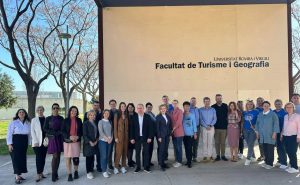Project Description

The ClimEd 7th Training on “Developing Skills to Use Climatic Information and Services for Various Climate-Dependent Branches of Economy” took place in a hybrid mode during 7-11 April 2025. The ClimEd project trainings are focused on training the faculty/ teaching/ research staff and postgraduates at the ClimEd partner institutions and collaborating organizations in advanced educational and information-and-communication technologies for building a flexible multi-level integrated practice-based education system in the field of Climate Services, Climate Change Adaptation and Mitigation.
In total, 79 persons (including 51 females and 28 males; and 15 young teachers/researchers) were accepted to participate in this onsite/online (hybrid) training. These were from the Ukrainian ClimEd partners and other institutions such as the ONU – Odessa I.I. Mechnikov National University (Odessa, Ukraine); KNUCA – Kyiv National University of Construction and Architecture (Kyiv, Ukraine); BekNU – O. Beketov National University of Urban Economy (Kharkiv, Ukraine); LPNU – Lviv Polytechnic National University (Lviv, Ukraine); BTNAU – Bila Tserkva National Agrarian University (Bila Tserkva, Ukraine); ONMedU – Odesa National Medical University (Odessa, Ukraine); ICSA – Institute of Climate-Smart Agriculture NAAS (Odessa region, Ukraine); and MoES – Ministry of Education and Science of Ukraine.
The training started with a series of lectures and practices (work in groups). The presented lectures covered the following topics/ blocks: B1 – Climate Data, Indices, and Products; B2 – Sectorial Climate Products; and B3 – Climate Information to Make Decisions & Develop Climate Service Prototype to Transform Data in Information.
On 7 April, the delivered lectures introduced definition and development of climate indices, application of Geographic Information Systems (GIS) in climate services, climate data as well as introduction to groups presentations (prepare the climatic dataset to extract actionable information; understand and compute ClimPact indices, calculate and analyze these; explore future climate scenarios using the Climate Information Platform/Portal (https://climateinformation.org); review sectoral data and compare it with climate information; and discuss potential actions based on climate information). The work in groups included practice with downloading climate data and applying ClimPact (a software package to calculate climate indices that are relevant for the health, agriculture and water sectors; https://climpact-sci.org).
On 8 April, the lectures focused on defining of climate needs, introduction to RStudio (an integrated development environment for R, a programming language for statistical computing and graphics) and Shiny (a web framework for developing web-based applications, originally in R, and since 2022 in Python; https://shiny.posit.co) Apps. The work in groups) included practice with definition and operationalization of sectoral indices, downloading data and computing sectoral indices, as well as functions to compute sectoral indices.
During 9-10 April, the feedback session on Moodle Courses and MOOCs (Massive Open Online Courses) developed under ClimEd Trainings 5 and 6 (in Autumn 2024 and Winter 2025; Tartu, Estonia) took place, approaches to evaluate the ecological conditions of ecosystems and their relationship to ecosystem services were also considered. The work in groups included practice in creating a Shiny App.
Finally, on 11 April, the focus was on Communication of Climate Service, when a series of presentations was delivered by Groups. Participants presented their group work/ project, received critical feedback and comments, answered on questionaries “Evaluation of the Course” and “Evaluation of the Learning Outcomes”, and attended a ceremony with awarding the ClimEd training certificates (with 3 ECTS credit points).
All materials of the training (slides and videos of lectures, presentations of exercises and homework assignments as group projects, etc.) are now available at: http://climed.network/events/climed-trainings/climed-training-7.
All Groups got high and good scores, and, respectively, have been awarded the certificates It was stressed that the participants of the ClimEd 7th training had obtained competencies, learning outcomes, skills in: (1) Identifying and selecting the most appropriate online sources of climate related data; (2) Downloading, quality checking and preparing climate related data in required formats; (3) Computing core climate indices, interpreting results in context of specific location; (4) Understanding sectorial climate information needs and defining sectorial indicators; (5) Identifying key climate-sensitive decisions within a selected sector of economy; (6) Selecting climate variables and thresholds to sector’s decision-making processes; (7) Formulating and justifying climate indicators tailored to support decisions; (8) Building basic functionalities (incl. input/ visualization/ output) of Shiny App to show climate information and sectorial indices; and (9) Integrating climate relevant information and indicators into Shiny App to explore and interpret data for supporting informed decision-making.
The e-evaluation of the ClimEd 7th Training was done using two questionnaires distributed among participants. Following the 1st questionnaire – on evaluation of the training – 97% of the participants estimated overall rating for this course as” very good” and “good”; training materials were of “excellent” (76%), and “very good” (20%) quality and information about the training was sufficient (96%), and participants will recommend such training to colleagues (100%). Following the 2nd questionnaire – on self-evaluation of the obtained competencies, learning outcomes and skills – about 97% of participants “fully agreed” and “mostly agreed” that they have obtained/ improved their competencies and got skills working as groups.
Special thanks to all lecturers of the training – Drs./Profs. Jon Xavier Olano Pozo, Anna Boqué, Enric Aguilar, (Universitat Rovira i Virgili, URV, Spain), Kalev Sepp, Veljo Kabin, Lagle Löhmus, (Estonian University of Life Sciences, EULS, Estonia), Dmytro Diadin (O. M. Beketov National University of Urban Economy in Kharkiv, Ukraine) – for their professionalism, enthusiasm, and commitment to the training; and URV team – Jon Xavier Olano Pozo, Anna Boqué, Enric Aguilar, Òscar Saladié,– for excellent organization, hosting and warm atmosphere during the training. Thanks to the Odessa National University (ONU, Ukraine) team members (Drs. Valeriya Ovcharuk, Inna Khomenko, and Nataliia Bulat, and IT-manager Vladimir Andrusenko) for support with ClimEd relevant modules development; e-evaluations; continuous web-update of the training materials.
See details in a summary document & photos from the 7th training.
Text by: Valeriya Ovcharuk, Inna Khomenko, Nataliia Bulat (ONU), Jon Xavier Olano Pozo, Anna Boqué (URV) & Hanna Lappalinen, Alexander Mahura (UHEL-INAR)